ERN GENTURIS spotlights
ERN GENTURIS spotlights
For spotlight interviews with patient representatives, please see the ePAG interviews page.
In the spotlights: Introducing the ERN GENTURIS coordinator, Marjolijn Ligtenberg
Posted on 23 April 2025
Name: Marjolijn Ligtenberg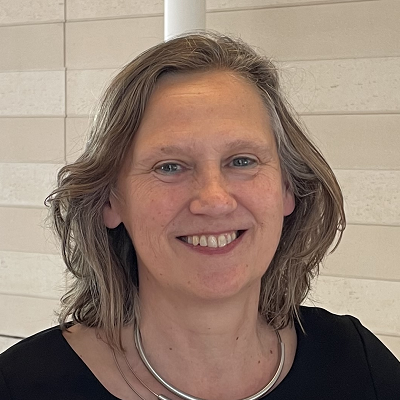
City: Nijmegen, the Netherlands
Institution: Radboudumc
Position: Coordinator of ERN GENTURIS and Head of the Laboratory of Tumor Genetics
Could you tell us briefly about your background?
I am Clinical Laboratory Geneticist and Clinical Scientist in Molecular Pathology with a special drive in optimizing the recognition of individuals with a genetic tumour risk syndrome (Genturis). Since over 30 years I have been working with clinicians, clinical laboratory geneticists and basic scientists to improve the recognition and care of these individuals by improving clinical workflows, lab procedures and unravelling the molecular background.
Could you tell us about your work and how you became involved in ERN GENTURIS?
Together with Nicoline Hoogerbrugge, the previous coordinator of ERN GENTURIS, I took the first steps towards the establishment of ERN GENTURIS as we felt we could improve the recognition and care of individuals with genturis by collaborating with experts throughout Europe. This turned out to be really successful as, thanks to all partners in ERN GENTURIS, over the past years a lot of knowledge was generated and shared for the benefit of our patients throughout Europe.
Could you tell us about your role as ERN GENTURIS coordinator/co-chair and what your goal is?
My goal is to foster the fruitful collaborations that grow in our ERN, such that we can improve the recognition and care of patients with a genetic predisposition to cancer. Together with my colleagues in the coordination team I aim to offer a strong fundament that facilitates collaboration among all participants in the ERN.
Could you tell us about current challenges related to ERN GENTURIS and its activities, and how you see the future?
My dream is to keep everybody within the ERN GENTURIS community motivated to work on a common dream to lighten the load of genetic tumour predisposition and to take advantage of the knowledge on genturis to enable better care for individuals at risk and with cancer.
What messages would you like to share with others?
To flourish we need to work with pleasure as a multidisciplinary team, in which we recognize talents and expertise, thereby creating a good atmosphere which energizes all participants.
In the spotlights: Marleen Kets
Posted on 23 April 2025
Name: Marleen Kets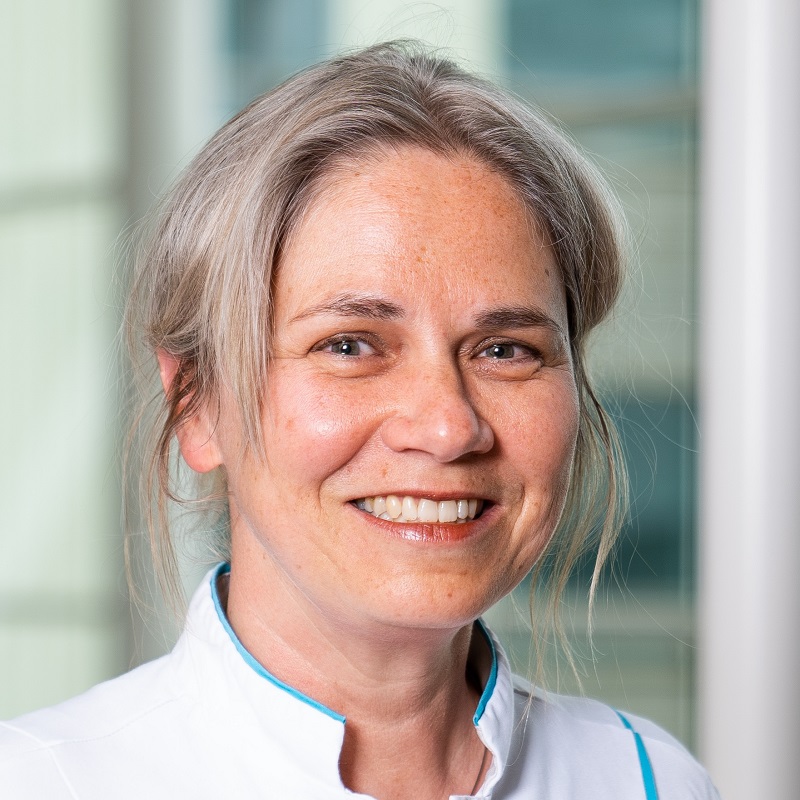
City: Nijmegen, the Netherlands
Institution: Radboudumc
Position: Clinical geneticist, MD, PhD
Could you tell us briefly about your background?
In 2008 I completed my training as a clinical geneticist and received my PhD on hereditary colorectal cancer with unknown genetic defect. Since then I have been working in the field of oncogenetics. I contributed to Dutch guidelines on hereditary breast cancer, ovarian cancer and PTEN Hamartoma Tumour Syndrome. I have also been member of the Executive Board and chair of the Cancer Genetics Group of the Dutch Society for Clinal Genetics. At the moment I am chair of the multidisciplinary working group for tumour and hereditary diagnostics, that advises various professional associations on matters at the intersection of tumour diagnostics and hereditary diagnostics.
Could you tell us about your work and how you became involved in ERN GENTURIS?
I am an experienced clinical geneticist specialised in genetic predisposition to cancer. I am head of theme oncogenetics within the clinical genetics section and head of the healthcare programme hereditary tumours within Radboud University Medical Centre. I am committed to personalized risk assessment and care for all patients with a familial or hereditary increased risk of cancer.
I was introduced in ERN GENTURIS by the former coordinator Nicoline Hoogerbrugge.
Could you tell us about your role as ERN GENTURIS co-chair and what your goal is?
As co-chair I will support the coordinator Marjolijn Ligtenberg as much as possible. I meet weekly with the project managers and chair a part of the CPMS meetings.
My ultimate goal is to preserve the health status of (healthy) patients with a hereditary increased risk of tumours and to optimise care of these patients.
Could you tell us about current challenges related to ERN GENTURIS and its activities, and how you see the future?
I am still orienting myself with the network. ERN GENTURIS is undoubtedly facing numerous challenges, but the future holds promise through collaboration.
What messages would you like to share with others?
I am very motivated to contribute to access to high-quality care for patients with rare tumour syndromes within the European Union and look forward to work together with all connected health care providers within ERN GENTURIS.
In the spotlights: Chella van der Post
Posted on 23 April 2025
Name: Chella van der Post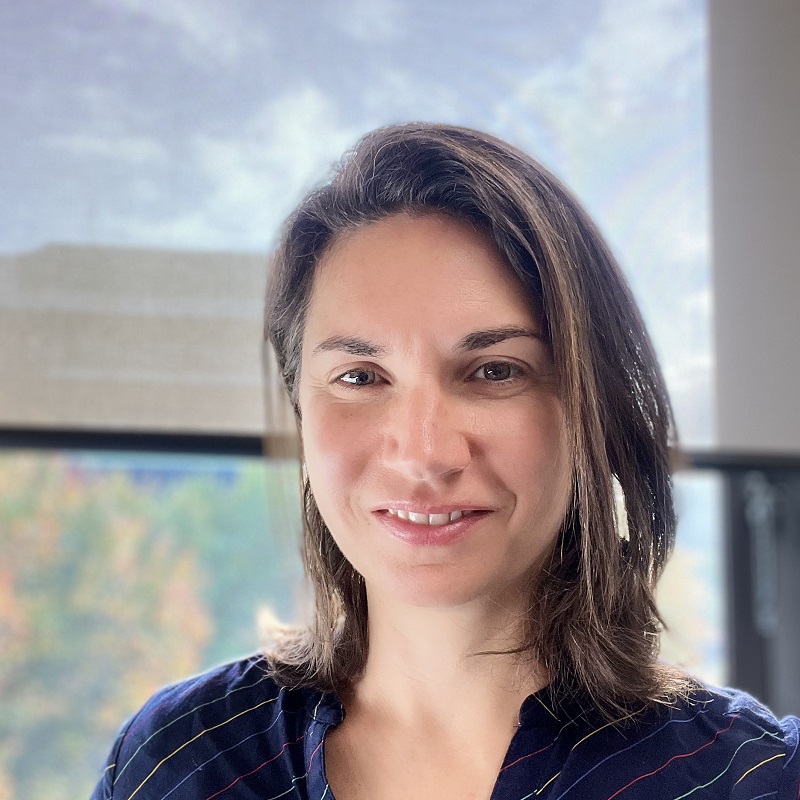
City: Nijmegen, the Netherlands
Institution: Radboudumc
Position: Co-chair of ERN GENTURIS, pathologist
Could you tell us briefly about your background?
I am a pathologist and Associate Professor of Hereditary Cancer at Radboudumc. Since completing my pathology training and obtaining my PhD in 2017, with a focus on familial gastric cancer, I have established myself as a leading expert in hereditary cancers. My research integrates histological analysis, computational pathology, molecular cancer progression, and clinical approaches, providing a comprehensive view of hereditary cancer diagnostics and progression.
Could you tell us about your work and how you became involved in ERN GENTURIS?
Nicoline Hoogerbrugge has done an outstanding job of highlighting the many opportunities within ERN GENTURIS, particularly through her inspiring leadership. I became involved in the Lynch Syndrome and Polyposis thematic group (TG2), where I have actively collaborated on several projects. Attending the annual meetings in Amsterdam gave me a firsthand look at the strong sense of engagement across Europe and the impressive network of projects and collaborations that have been built. These experiences have deepened my motivation to contribute further to ERN GENTURIS goals, especially in improving care and research for hereditary cancer syndromes.
Could you tell us about your role as ERN GENTURIS co-chair and what your goal is?
In the field of rare diseases, collaboration across Europe is essential, and I aim to actively contribute to strengthening these connections. In addition to fostering new collaborations, I would like to place greater emphasis on in-depth discussions of key topics, including hereditary tumor histology and emerging opportunities in identification of patients with hereditary disease. This includes the integration of artificial intelligence for identifying new patients and improving surveillance strategies.
My ultimate goal is to preserve the health status of (healthy) patients with a hereditary increased risk of tumours and to optimise care of these patients.
Could you tell us about current challenges related to ERN GENTURIS and its activities, and how you see the future?
The thematic groups and task forces have laid a strong foundation, including the development of many projects and guidelines. In the coming years, we expect to see follow-up initiatives emerging from this groundwork. One of the main challenges remains finding both the time—for the many clinicians and researchers involved—and the funding opportunities needed to collaborate effectively on new research initiatives aimed at improving care for families affected by hereditary cancer.
What messages would you like to share with others?
I'm excited to bring my histological experience to the team and to work together on innovative projects that advance our understanding of hereditary cancer.
|
|
In the spotlights: Meet Rianne Oostenbrink
Posted on 26 March 2025
Name: Rianne Oostenbrink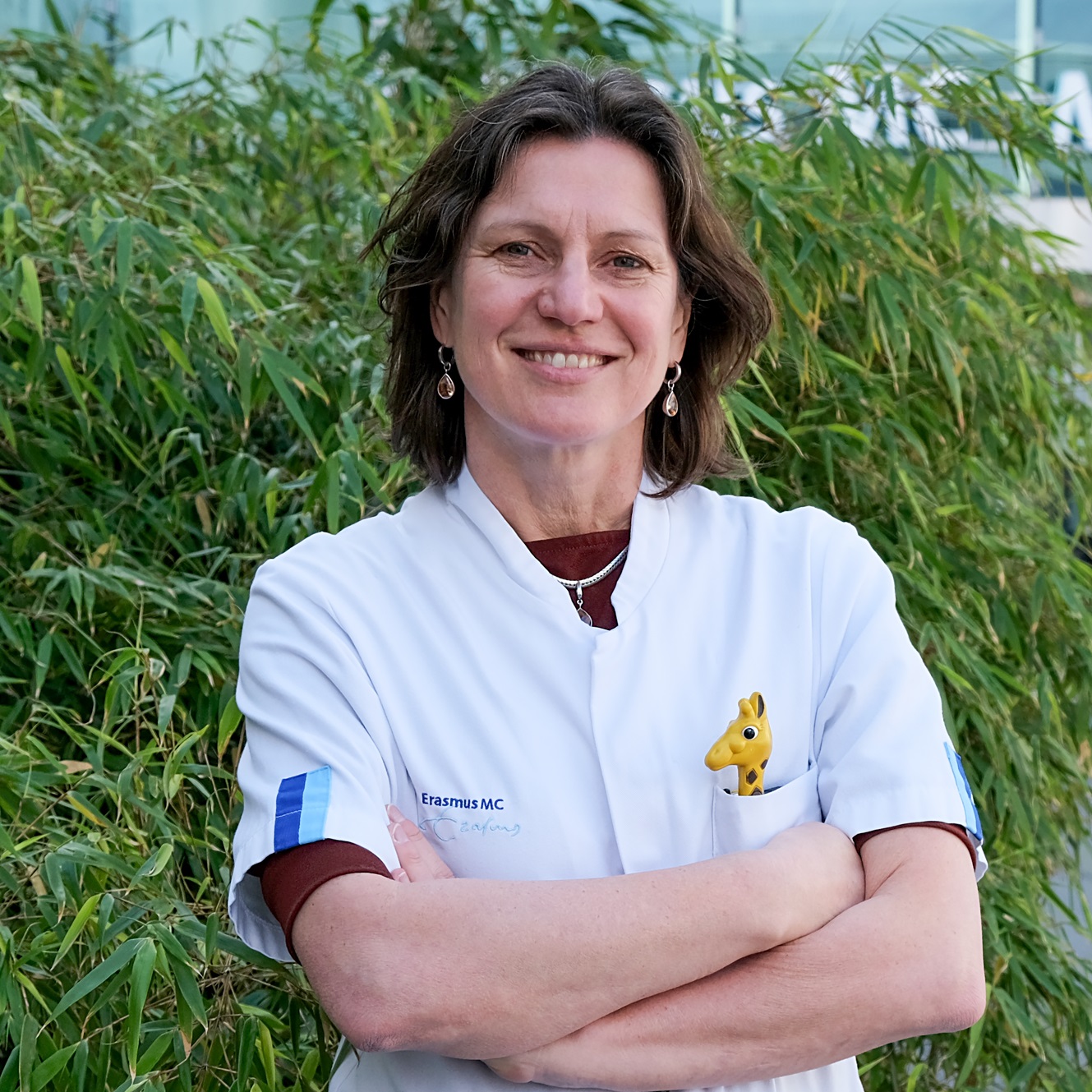
City: Rotterdam, the Netherlands
Institution: ErasmusMC – Sophia
Position: Paediatrician
ERN GENTURIS: Thematic Group 1 Leader
Could you tell us briefly about your background and the work you do related to ERN GENTURIS?
I am a paediatrician working in the ErasmusMC – Sophia, Department of General Paediatrics. Our institute is the national expertise centre for Neurofibromatosis (type 1) and coordinates the national NF1 care network, with treatment centres throughout our country, to provide care ‘nearby the patient if possible, and centralized if required’.
I started working on Neurofibromatosis in 2006, joining my colleague Arja de Goede, who initiated this centre 20 years prior. My interest in the condition is the combined aspects of tumour predisposition/oncology, neurology and developmental problems.
At our centre we have been specialised for many years in monitoring neurodevelopmental aspects of NF1, and we have a large natural history cohort of children up to young adults. More recently, our research has been focusing on longitudinal history studies on benign tumours and treatment.
How does being a member of ERN GENTURIS help doctors in providing care to patients?
The ERN GENTURIS offers the unique facility of easy access to clinicians with expertise in GENTURIS conditions. This may be helpful in particular for those clinicians lacking international contacts. But also, it makes sure that in organising care for the patient or in developing guidelines, we consider all different health care settings in Europe.
Could you share your experience with genturis patients and their relatives in your clinical practice? How can you detect them and how are they referred?
In the Netherlands, we receive referrals from general practitioners or colleagues from preventive medicine practices, but also from other hospitals for second opinion advice. Finally, we receive referrals from the treatment centres in our national NF1 network that suffer from NF1 complications, e.g. large plexiform neurofibromas. In principle, we have the strategy to have all NF1 patients being seen in the expertise centre at diagnosis, and at so-called ‘cross-ages', i.e. 4-6 years (starting school), 11-12 years (secondary school), 15-16 yrs (transition to adult care). Next, in our network, we aim to improve the continued care for adults, with scheduled follow-up each 3-5 years in one of the treatment centres.
How can ERN GENTURIS benefit patients in your country? Do you use clinical guidelines that are produced by ERN GENTURIS in your clinical practice? If so, what are the main benefits?
We use the ERN GENTURIS guidelines for NF1. The NF1-care pathway is helpful to guide follow-up visits where, when and for what. However, I think the guidelines should allow to adjust care to the local setting. E.g. some advice for imaging may be needed if adults do not have access to scheduled follow-up, but its value versus drawbacks (coincidental findings with low clinical relevance) may be less in other settings.
Next, we benefit from the international discussions on complex patients within the GENTURIS.
Do you think it would be important to have a separate consultation for the GENTURIS patients in your practice and why? Please explain.
We have a weekly specialised clinic for NF1 patients, both for adults and children, in our institution. For the children we organise it in a multidisciplinary setting, with a paediatrician, neurologist, ophthalmologist and clinical geneticist.
What key messages would you like to share with those within your speciality?
Although many complications of NF1 or NF1 itself cannot be cured, providing good information is very important to patients and their caregivers. This is also part of care and improves their live with the condition. That is also why we think it is important patients are seen in centres with expertise for the condition. Next, NF1 manifestations may often need a different approach then when occurring without NF1, and a multidisciplinary team is essential.
Do you have a specific genturis case/family that had an impact on your clinical practice? Please share a story.
I remember a girl known from her pre-school age with suspicion of NF1 by clinical characteristics (although not completely fulfilling the criteria). Since we were unable to confirm the diagnosis genetically, we could only provide general guidance to address concerns about her neurocognitive function.. In absence of confirmed diagnosis, we followed up at intervals of 3-5 years to discuss clinical problems. Finally, at late adolescence we were able to confirm the diagnosis of NF1 with newer genetic techniques. In addition to confirming diagnosis, this also helped to provide proper advice for adult care and family planning, which previously was kept in doubt. I think this example shows the importance of review for diagnosis in time, and the benefit of close collaboration of geneticists and paediatricians (in this case), to share thoughts upon (new) genetic options and interpreting clinical symptoms.
How are ERN GENTURIS guidelines distributed in your country?
We have distributed the ERN guidelines through the national NF1 expertise network and have discussed with our national colleagues how to implement the recommendations. In addition we have shared the links of the care plan on the website.
In the spotlights: Meet Said Farschtschi
Posted on 26 March 2025
Name: Said C. Farschtschi, MD 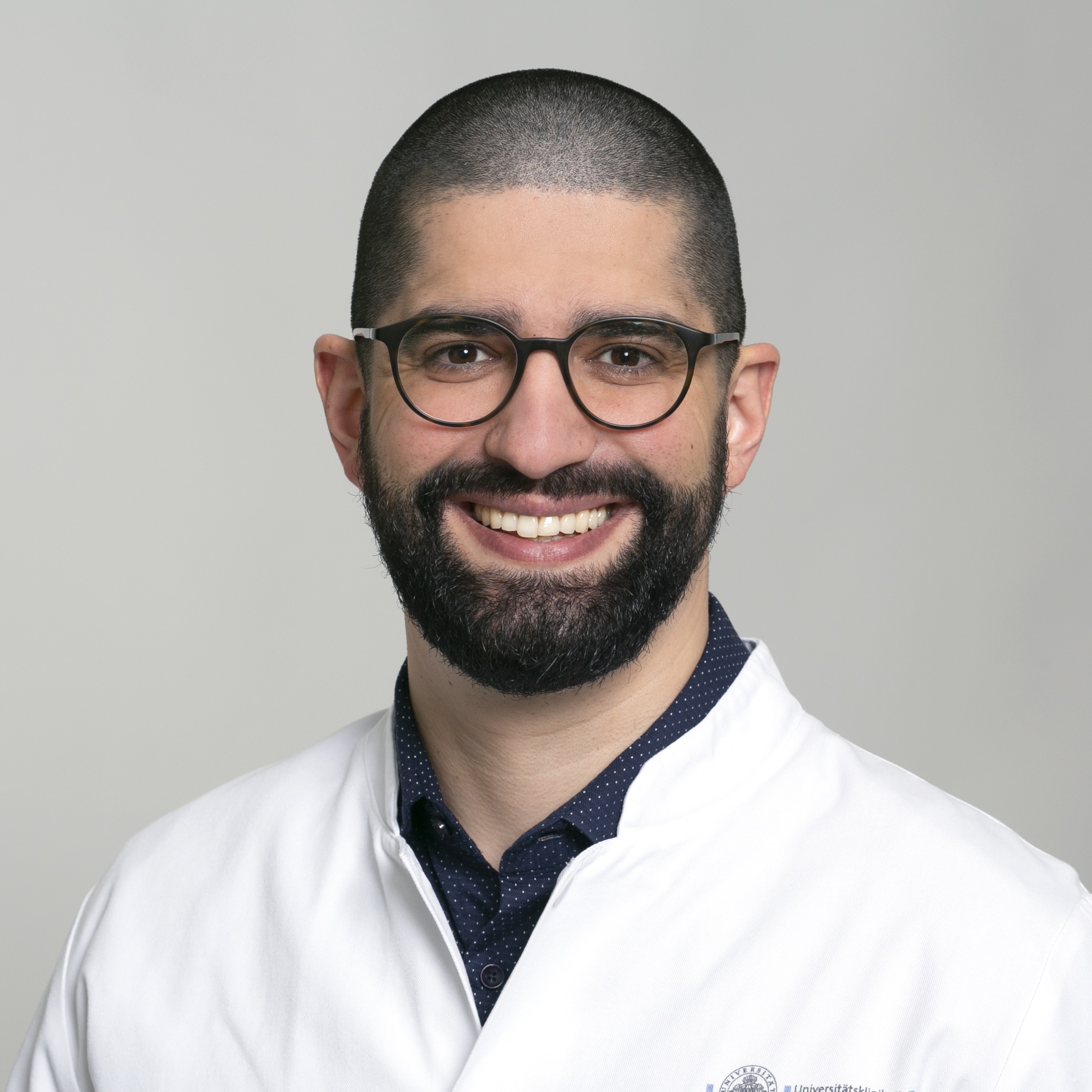
City: Hamburg, Germany
Institution: University Medical Center Hamburg-Eppendorf, Germany
Position: NF-specific genetic diagnostics and genetic counselling, consultant neurologist, head of phacomatoses section, Neurofibromatosis outpatient department and day clinic, Department Of Neurology
ERN GENTURIS: Thematic Group 1 Leader
Could you tell us briefly about your background and the work you do related to ERN GENTURIS?
I am a neurologist by training and run a genetic lab in the University Medical Center Hamburg-Eppendorf, Germany. Since 2022 I am head of the phacomatoses section. The section focuses on the diagnosis and treatment of entities of the whole NF-spectrum and I see children, adolescents and adults with NF1, NF2- and non-NF2-related-schwannomatosis and related disorders. Patients can visit us in our outpatient centre or – in more complex cases – through our day clinic. Here we offer the full spectrum of diagnostics and interdisciplinary treatment specifically tailored to NF-spectrum-disorders. As one of the largest centres I see about 1.500 patients a year. Through our NF-reference-board more cases from all over Germany can be referred to our centre. Scientifically I am interested in clinical and translational research on imaging, pain and risk-stratification. In our lab (Lan Kluwe, PhD and Tabea Hartung, MD) we offer the full spectrum of state of the art genetic testing and also perform basic genetic research.
How does being a member of ERN GENTURIS help doctors in providing care to patients?
We face different problems in the clinical care of NF-spectrum-disorders. First we still have few clinical guidelines in a disease that differs extremely from sporadic manifestations. For instance we see an increased risk for breast cancer in NF1 and have some few evidence that those cancers differ also biologically but that does not result in specific clinical guidelines or studies. ERN can help bring centres in Europe together and built a basis for more decisive clinical and management guidelines. We only will be able to help patients if we develop disease-specific treatment strategies.
Could you share your experience with genturis patients and their relatives in your clinical practice? How can you detect them and how are they referred?
Unfortunately, many patients still undergo an odyssey until referred to a speciality centre. In addition, most NF-centres have limited resources leading to long waiting lines. Although the ERN-guidelines help a lot regarding acknowledgment and visibility for these entities, the care for NF and other GENTURIS is dependent of few specialized centres. Most patients are referred by paediatricians or general practitioners, sometimes also from geneticists. At a patients first visit I try to take as much time as possible to inform about the disease and screen for current needs, not only for the utmost concern. In a multidisciplinary team, we discuss existing reports and imaging. Every patients will then undergo an individual risk-stratification and offered a treatment plan. Most patients are seen yearly, so we need to interact with local healthcare providers to provide more frequent follow up visits. In urgent cases we offer inpatient treatment. For the initial diagnosis, we offer genetic and clinical counselling from one hand.
How can ERN GENTURIS benefit patients in your country? Do you use clinical guidelines that are produced by ERN GENTURIS in your clinical practice? If so, what are the main benefits?
We use the ERN GENTURIS guidelines for NF1 and schwannomatosis a lot. We just recently developed a national treatment plan based on the guidelines and plan to develop a binding national guideline. I think guidelines are the fundamental basis for the improvement of clinical care for these complex conditions. In many cases treatment is solely based on decisions of single disciplines or HCPs, sometimes not aknowledging current knowledge. Especially surgical treatment has to be indicated against the background of newly developped pharmaceutical options. To my opinion this is only possible in specialized centers. Guidelines help both the patients and the clinicians to route the patient to the right treatment.
Do you think it would be important to have a separate consultation for the GENTURIS patients in your practice and why? Please explain.
In our institution we are very specialized. I work on NF and associated disorders in its entirety, other GENTURIS are attached to the department of medical genetics (PD Dr. Alexander Volk). We work closely together combining our expertise and coordinate further disciplines necessary.
What key messages would you like to share with those within your speciality?
Surprisingly, genturis – in my case NF – are often still recognized as an untreatable whim of nature. Although not being able to heal NF we are indeed able to treat and improve many manifestations and reduce health-related risks by individual risk-stratification and treatment plans. I want to encourage every neurologist to rely on the tight-knit network of GENTURIS and NF-specialists to help patients and their families. There should be no place for bickering over responsibilities.
Do you have a specific genturis case/family that had an impact on your clinical practice? Please share a story.
I completed my civil service at the NF-outpatient center in 2004. This was not only encouraging me in my wish to study medicine but also showed me a harsh asymmetry in clinical care in disadvantage for chronic and rare disease. It also showed me that medicine is not a concept of altruistic help but moreover a pragmatic and compassionate social contract we all participate in. Throughout my later career I met many patients again, some of them still being in my care 20 years later. Three of them changed my view on the current healthcare system: one was my professor in physiology during medical school, he still is in my care, being himself a mentor for my education in preclinical med school; one is a paediatric nurse not being able to do her job, because parents were scared by the lumps on her skin, she now is a study nurse in my department. The last one I met as a child during my civil service, he also is in my care now as an adult. He is peer educating through Instagram about NF1 and his experiences with studies, he also comes to my lectures to give students a real-life example of life with a rare disease. In conclusion I see clinical care for GENTURIS not only as provision of diagnostics and therapy but more as a way to implement current knowledge and provide the same standard of care to patients with rare disease as fulfilment of the above mentioned social contract.
How are ERN GENTURIS guidelines distributed in your country?
We crosslinked the ERN guidelines through our websites. Moreover, the German lay organisation “Bundesverband Neurofibromatose”, which I chair since 2017, is distributing them through online and print media. Over our national NF-network we implemented together with Prof. Thorsten Rosenbaum (Duisburg) and PD Dr. Johannes Salamon (Bad Oldesloe) the ERN guidelines in a national treatment checklist.
In the spotlights: Meet Liliana Sousa
Posted on 14 February 2025
Name: Liliana Sousa 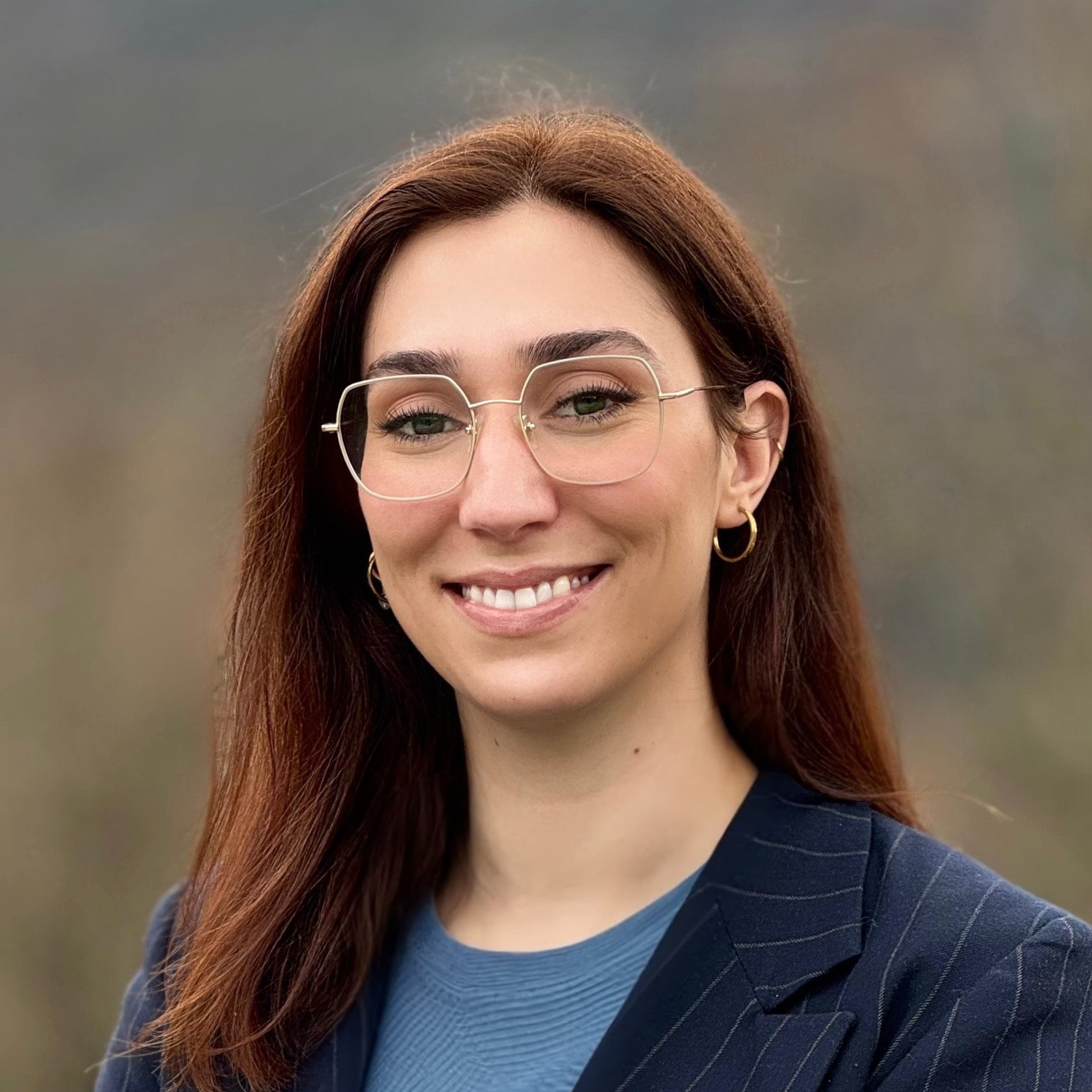
City: Porto, Portugal
Institution: i3S - Instituto de Investigação e Inovação em Saúde
Position: Junior Researcher – Project Manager
Could you tell us a little bit about your background and how you got involved with ERN GENTURIS?
I originally studied Clinical Laboratory Sciences and Public Health because I always knew I wanted to work in healthcare. But pretty quickly, I realized it wasn’t quite the right fit for me. I wanted something broader, more dynamic. That’s when I did my master’s in Healthcare Management, and I knew I had found my path. After that, I started working with Carla Oliveira, who introduced me to the world of hereditary cancer and, of course, to GENTURIS. Since then, I’ve been focused on project management, helping drive healthcare professionals’ involvement in research, which also became the focus of my PhD.
Why is it important to engage healthcare professionals in research, and what challenges do you see?
Because they’re the ones on the front lines with patients! Their insights and experiences are essential for shaping better diagnostics, treatments, and guidelines. But the reality is, many professionals struggle to find the time, resources, or even institutional support to get involved in research. There’s also the challenge of making research feel accessible. Many see it as something separate from their daily work, when in fact, it should be an integrated part of improving patient care.
How does ERN GENTURIS help professionals collaborate and improve patient care?
It creates this amazing space for collaboration across countries. Whether it’s through clinical guidelines, expert case discussions, or research projects, ERN GENTURIS connects professionals who might otherwise never cross paths. It also gives access to specialized knowledge that can directly impact how patients are diagnosed and treated.
From a project management perspective, what initiative within ERN GENTURIS has had the most impact?
It’s hard to pick just one because ERN GENTURIS does so much! The combination of publications, courses, educational materials, and expert discussions really makes a difference. The network helps spread knowledge beyond just specialists. It reaches healthcare professionals who might not have had access to this level of expertise otherwise. Seeing how these resources are used in different countries and how they help improve patient care is incredibly rewarding. It’s not just about creating materials, it’s about building a community that actively shares knowledge and improves outcomes for GENTURIS patients.
What message would you like to share with healthcare professionals about research and hereditary cancer care?
Research isn’t just for academics in labs, it’s for every healthcare professional who wants to improve patient care. Even small contributions, like participating in a study, following updated guidelines, or sharing cases with expert networks, make a huge difference. And hereditary cancer care, in particular, benefits so much from collaboration. No one can know everything, but together, we can provide better care and earlier diagnoses for families who need it.
In the spotlights: Meet Mikk Tooming
Posted on 14 February 2025
Name: Mikk Tooming 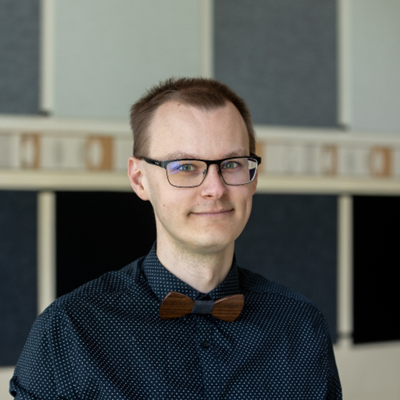
City: Tartu, Estonia
Institution: Tartu University Hospital Genetics and Personalized Medicine Clinic / Tartu University, Institute of Clinical Medicine, Department of Genetics and Personalized Medicine
Position: Clinical molecular geneticist - research & development
Could you tell us a little bit about your background and introduce the members of the team?
I am a junior researcher specializing in breast and ovarian cancer, currently pursuing a PhD in Medicine at the University of Tartu. With a Master's degree in Biomedicine and a strong background in molecular genetics, I contribute to the Genetics and Personalized Medicine Clinic at Tartu University Hospital. As a Senior Research and Development Laboratory Specialist, I collaborate with a multidisciplinary team of geneticists, clinicians, molecular geneticists, and bioinformaticians. We employ advanced technologies like next-generation sequencing to improve genetic testing and tailor treatment plans for patients. Our goal is to bridge the gap between research and clinical practice, delivering high-quality, personalized genetic services.
Could you briefly describe the organization of your MDT (multidisciplinary team)? How often are genetic tumour risk syndrome (genturis) cases discussed?
Our multidisciplinary team at our clinic includes geneticists, molecular geneticists, and other healthcare professionals. We meet regularly to review complex cases, especially those involving hereditary tumor syndromes like genturis. This collaborative approach ensures that patients receive timely and accurate genetic diagnoses and treatment recommendations.
Could you tell us briefly about the work you do related to ERN GENTURIS?
As a member of Taskforce 6 within ERN GENTURIS, we focus on collaboration, communication, and patient empowerment. We work closely with the network to ensure our patients have access to the latest guidelines and research findings on rare genetic tumor risk syndromes. Our goal is to bridge the gap between research and clinical practice, ultimately improving patient outcomes.
What message do you have for the international medical community?
Collaboration and knowledge-sharing are essential in the rapidly evolving field of personalized and preventive medicine. By harnessing our collective expertise in genetic risk factors, we can drive innovation and ensure equitable access to high-quality genetic services. Together, we can advance precision medicine and improve patient outcomes globally.
In the spotlights: Professor Nicoline Hoogerbrugge
Posted on 27 November 2024
Name: Nicoline Hoogerbrugge 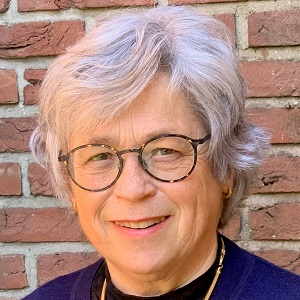
City: Nijmegen, the Netherlands
Institution: Radboud University Medical Centre
Position: Coordinator of ERN GENTURIS
What is your greatest achievement as ERN GENTURIS coordinator?
ERN GENTURIS is a well-functioning ERN. The members of the 51 centres in this ERN know each other very well. Patients are also very involved in our ERN and have even given the final push to get this ERN formed.
What have you learned from this experience?
Communication is key. Making plans and converting them into actions is easier with a lot of communication. GENTURIS therefore organizes a physical meeting twice a year, attended by at least one representative of all 51 centres and several patient representatives. This results in great discussions, but also in conviviality, which promotes cooperation.
There is also a lot of communication and collaboration in other areas within this ERN. Every two weeks, virtual meetings are organized for doctors in which complex patients are discussed. They also meet once a year to give courses to students from all over Europe. Through these different forms of collaboration, you learn from each other and get to know each other well.
What would you like to pass on to others?
First of all: if you are convinced that something is useful and meaningful for patients, go for it. Even if the wind is against you; just keep going and keep going.
Also, make sure that you see and speak to the people you work with. Meeting eachother physically promotes online conversations and this makes the collaboration more valuable and successful.
In the spotlights: Meet Professor Kathleen Claes
Posted on 28 October 2024
Name: Kathleen Claes 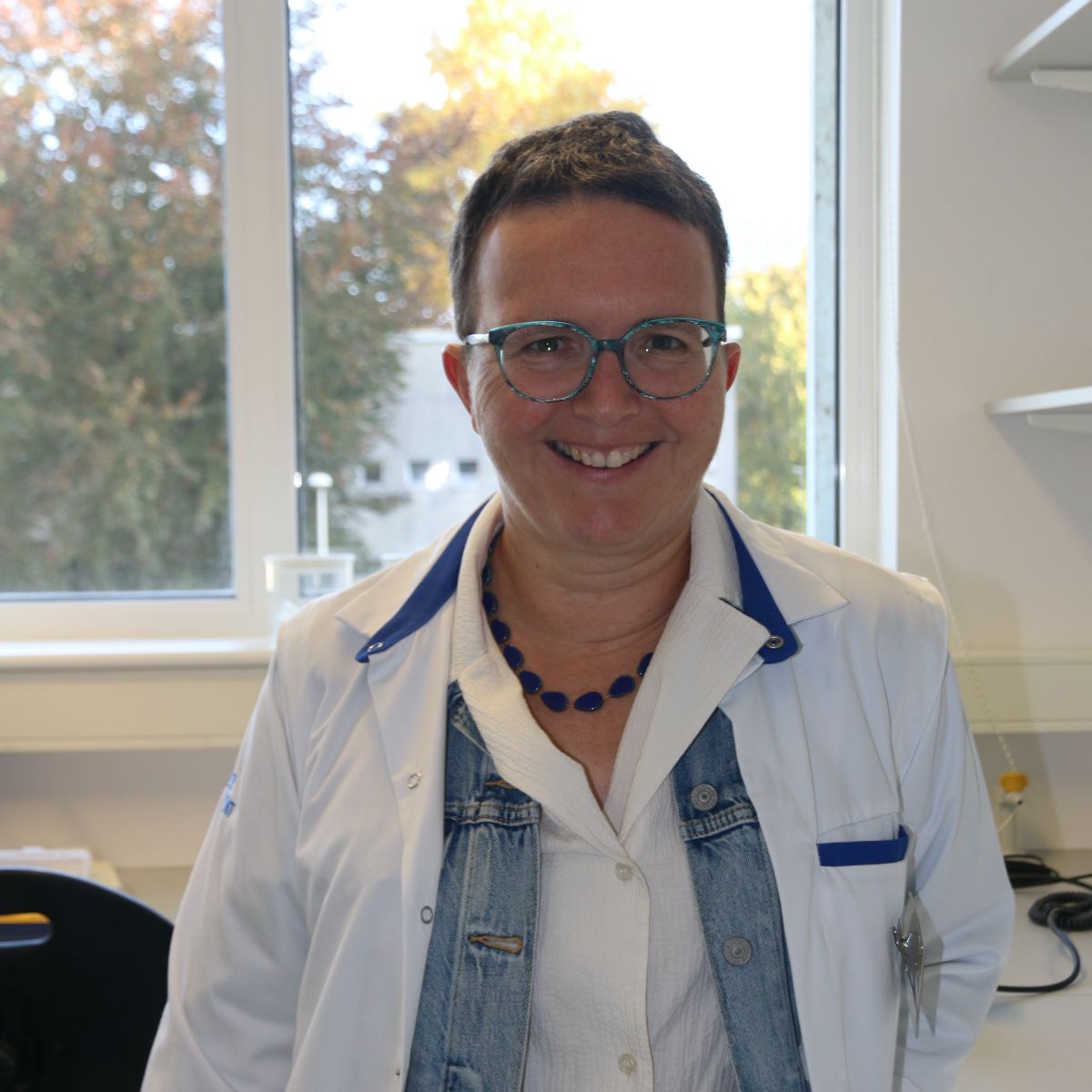
City: Ghent, Belgium
Institution: Ghent University Hospital
Position: Clinical laboratory geneticist
Could you tell us a little bit about your background and introduce the members of the team?
I am a clinical laboratory geneticist with a major interest in molecular diagnostics for cancer predisposition syndromes. The increasing knowledge on cancer-associated genes and mutation mechanisms coupled with technological innovation makes this a dynamic and ever-expanding field.
Together with Robin De Putter I am a designated reference within our hospital for ERN GENTURIS. We have close contact with treating physicians taking care of treatment and/or screening of genturis patients, and are actively involved in writing ERN GENTURIS guidelines.
Could you briefly describe the organisation of your MDT (multidisciplinary team)? How often are genturis cases discussed?
Within our hospital we take care of genturis patients with a multidisciplinary team. Hereby, a close link between the laboratory and the clinic is key.
Within the laboratory, there is cross fertilisation between clinical laboratory geneticists, involved in germline testing of cancer predisposition genes and the colleagues responsible for interpretation of next generation sequencing data from tumours. We strongly believe that sharing our expertise on germline and somatic testing ensures the best care for genturis patients, who benefit from evidence-based variant interpretation that guarantees the best outcome with targeted therapies, and adequate follow up for themselves and their relatives at risk. At our biweekly meetings challenges for the workup of complex genturis cases are discussed. These also allow to streamline the multidisciplinary care and make sure our approaches remain well aligned.
Could you tell us briefly about the work you do related to ERN GENTURIS?
Since the start of ERN GENTURIS in 2017 I was involved in taskforce 6 (TF6) on Collaboration, communication, dissemination and patient empowerment. Initially, we were a very small team, which has now been extended with several people.
Furthermore, I participated for the first time as a teacher at the ERN GENTURIS Bertinoro course about hereditary cancer genetics. Participants were clinical geneticists, genetic counsellors, clinical laboratory geneticists, oncologists, pathologists and PhD students and postdocs involved in (hereditary) cancer research. I gave a lecture on tumour versus germline genetics and a workshop on variant interpretation. I really enjoyed the very interactive sessions and the fantastic atmosphere. I highly recommend this course for all professionals starting or already involved in care for genturis patients.
As HCP we are also happy to collaborate on scientific projects and papers involving genturis patients. I co-authored the guidelines for Li Fraumeni and TP53 related cancer syndromes and PTEN hamartoma tumour syndrome. We also contributed to a study on noncoding aberrations in mismatch repair genes in patients with a clinical diagnosis of Lynch syndrome.
As we strongly believe that research related to diagnostics, treatment and disease prevention of genturis patients can be further improved via data sharing, we are very interested to contribute to the ERN GENTURIS registry. We are currently working with the data science institute in our hospital on automatic data extraction from the electronic patient files.
What message do you have for the international medical community?
In fields like cancer genetics, where research is evolving rapidly, international collaborations are essential to staying at the forefront of innovation and providing the best possible outcomes for genturis patients.
In the spotlights: Meet Kleoniki Roka, MD, PhD
Posted on 18 September 2024
Name: Kleoniki Roka 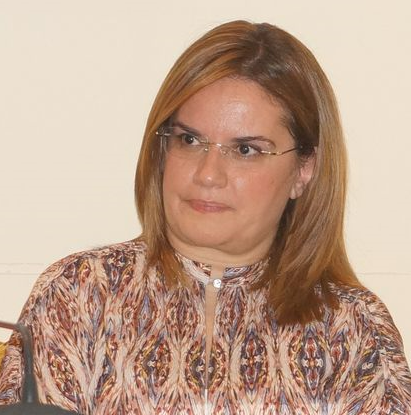
City: Athens, Greece
Institution: Aghia Sophia Children’s Hospital
Position: Senior attending physician
Could you tell us briefly about your background and the work you do related to ERN GENTURIS?
Since I joined the Division of Paediatric Haematology-Oncology, First Department of Paediatrics, National and Kapodistrian University of Athens in “Aghia Sophia” Children’s Hospital, Greece, in 2015, as a Consultant in Paediatric Haematology-Oncology, my main interest has been neuro-oncology and neurocutaneous disorders. In this respect, and under the guidance of the head of the divisional Professor Antonis Kattamis, and the collaboration of the neurology department we organized the first NF Multidisciplinary Team (MDT) Clinic in Greece. My participation in preparing the application for recognition of the Clinic as a National Center of Expertise for NF and Cancer predisposition syndromes and later for full membership to the ERN GENTURIS was pivotal. Indeed, the ‘Aghia Sophia’ Children’s Hospital was accepted as a Full Member for NF1 in the ERN GENTURIS, in January 2022 and it is the only purely paediatric hospital in the Network. Through my capacity as a member of the NF MDT, I have a strong collaboration with the Panhellenic organization of NF patients and their friends known as “Living with NF”, in informing and educating patients, families, and their friends about NF.
The NF MDT Clinic is attending more than 200 children with NF1 and I am responsible for the neurooncological follow-up of the paediatric patients. Through our collaboration with ERN GENTURIS, I am now participating as a member of the extended team of the Thematic Group 1 for Neurofibromatosis, and a member of the core team of Task Force 6 for collaboration, communication, dissemination, and patient empowerment in the European Reference Network GENTURIS.
How does being a member of ERN GENTURIS help doctors in providing care to patients?
Participation as a member of ERN GENTURIS is an excellent opportunity to improve the care of patients through attending educational webinars and regular meetings in which interesting cases are presented and discussed. Doctors may also share their experiences and knowledge in rare and unusual situations. Furthermore, the development of guidelines or recommendations on the surveillance and treatment of rare disease, one of the major tasks of the ERNs, has improved the care of patients.
Could you share your experience with genturis patients and relatives in your clinical practice? How can you detect them and how are they referred?
The NF MDT Clinic operates within the largest pediatric hospital in Athens, Greece providing consultation to all patients with suspected or confirmed NF diagnosis. Furthermore, since the NF MDT Clinic was established, several lectures at congresses of different specialties have been given nationwide to raise awareness and inform about the health services provided through the new structure. The strong collaboration with the Panhellenic organization of NF patients and their friends known as “Living with NF”, in informing and educating patients, families, and their friends about NF has further increased recruitment of patients. Finally, the Clinic accepts referrals of all patients with possible or diagnosed NF for consultation nationwide and from neighbouring countries.
They are usually referred to my practice through multidisciplinary teams, genetic counseling services, or other specialists who suspect a genetic component in the patient’s condition. Additionally, some patients come to us through family members who have already been diagnosed with a related condition, prompting proactive screening and management.
How can ERN GENTURIS benefit patients in your country? Do you use clinical guidelines that are produced by ERN GENTURIS in your clinical practice? If so, what are the main benefits?
ERN GENTURIS has already helped patients in my country by providing clinical guidelines produced by ERN GENTURIS. Health professionals are constantly informed about the diseases, especially NF and the specialized clinic for these patients. Increased awareness has increased referral of patients upon suspicion, and communication with the experts, thus improving early diagnosis and proper surveillance. Patients and their families have welcomed the collaboration within ERN GENTURIS with great enthusiasm and feel more confident that their disease and complications although rare can be discussed with experts in Europe.
What key messages would you like to share with those within your specialty?
Collaboration and exchange of knowledge make us better!!!
In the Spotlights: Meet Angela Mastronuzzi, MD, PhD
Posted on 6 September 2024
Name: Angela Mastronuzzi 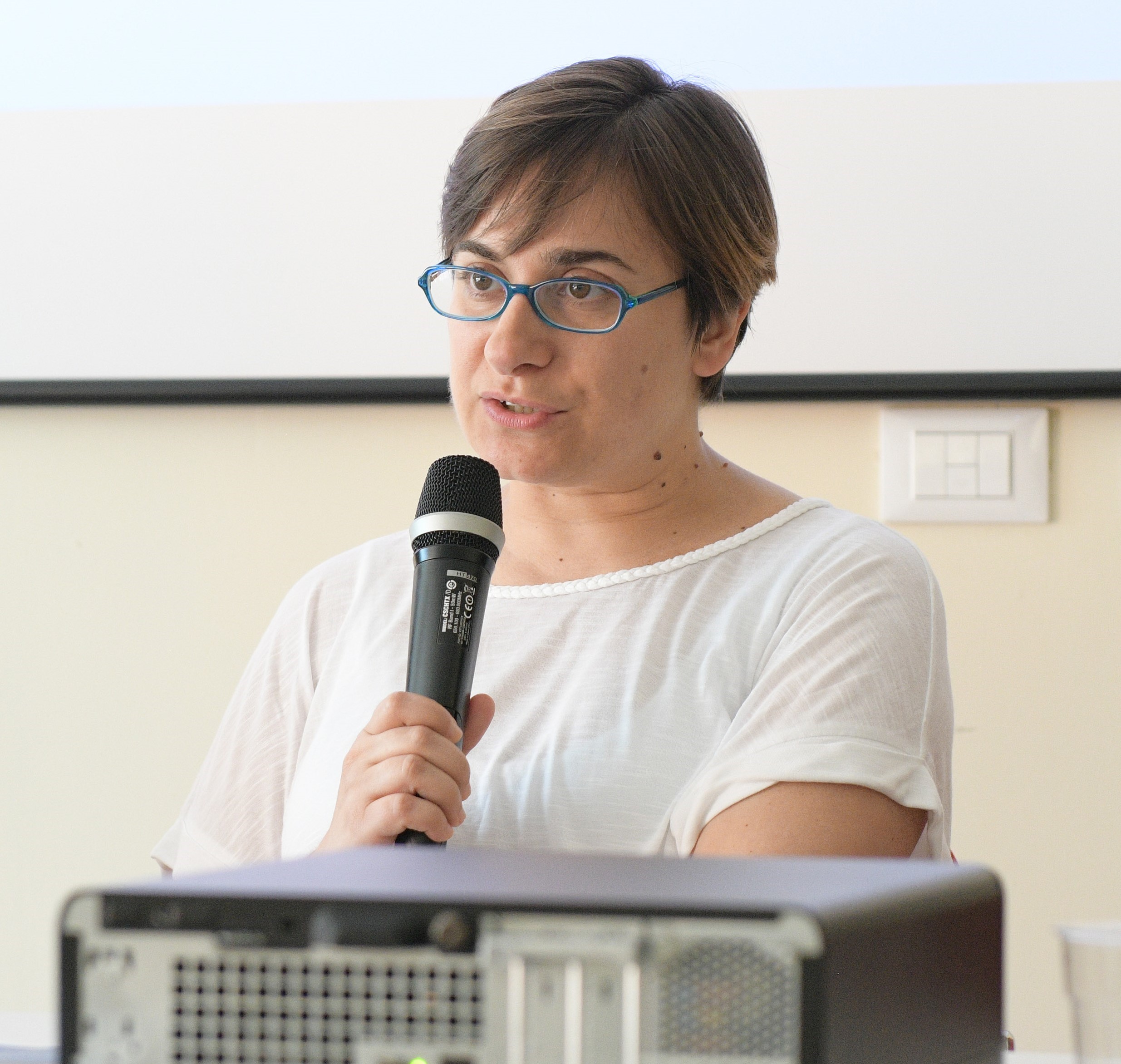
City: Rome, Italy
Institution: Bambino Gesù Children’s Hospital (OPBG)
Position: Head of Neuro-Oncology Unit, Area of Hematology-Oncology, Cell and Gene Therapies, and Hematopoietic Transplantation
Could you tell us briefly about your background and the work you do related to ERN GENTURIS?
I am a pediatric hematologist-oncologist with a particular focus on central nervous system tumors and cancer predisposing syndromes, implementing molecular diagnostics to study genetic anomalies both at the germline and somatic levels. I serve as a designated reference for OPBG within the ERN GENTURIS and ERN PaedCan networks, and I specialize in innovative and personalized treatments with a multidisciplinary approach for pediatric cancer, specifically in phase I clinical trials, targeted therapy, cell therapy, and gene therapy.
How does being a member of ERN GENTURIS help doctors in providing care to patients?
Being an ERN GENTURIS member greatly enhances a doctor’s ability to provide comprehensive care to patients, especially in my field. The network facilitates access to a broad range of expertise and resources from specialists across Europe, allowing for collaborative decision-making and tailored treatment plans. This multidisciplinary approach ensures that patients receive the most current and effective care, particularly in complex cases involving rare genetic conditions. Additionally, it provides opportunities for continuous professional development, ensuring that we stay at the forefront of advances in diagnosis and treatment.
Could you share your experience in your clinical practice with genturis patients and relatives? How can you detect them and how are they referred?
My experience with genturis patients has been extensive, particularly in the context of pediatric oncology where I frequently encounter cases involving brain tumors and cancer predisposition syndromes. These patients can be detected through a combination of detailed family history assessments, genetic testing, and clinical features suggestive of an underlying genetic predisposition. Early signs such as multiple primary tumors, young age at onset, or a strong family history of cancer often prompt further investigation.
They are usually referred to my practice through multidisciplinary teams, genetic counseling services, or other specialists who suspect a genetic component in the patient’s condition. Additionally, some patients come to us through family members who have already been diagnosed with a related condition, prompting proactive screening and management.
How can ERN GENTURIS benefit patients in your country? Do you use clinical guidelines that are produced by ERN GENTURIS in your clinical practice? If so, what are the main benefits?
The benefits of ERN GENTURIS for patients in Italy are significant, particularly for those with rare genetic conditions and cancer predisposition syndromes. The network provides access to specialized knowledge and expertise that may not be readily available locally, ensuring that patients receive the highest standard of care regardless of where they live. By facilitating cross-border collaborations and consultations, ERN GENTURIS helps to optimize diagnosis, management, and treatment strategies for complex cases.
In my clinical practice, I do use the clinical guidelines produced by ERN GENTURIS. These guidelines are invaluable in standardizing care, ensuring that all patients receive evidence-based interventions. The main benefits include improved accuracy in diagnosing genetic syndromes, more personalized treatment plans, and better overall outcomes for patients. Moreover, these guidelines help to streamline multidisciplinary care, ensuring that all relevant specialists are aligned in their approach to managing these challenging conditions.
Do you think it would be important to have a separate consultation for the genturis patients in your practice and why, please explain?
I believe it would be very important to have a separate consultation for genturis patients in my practice. These patients often require specialized attention due to the complexity of their conditions, which involve genetic predispositions to cancer and other related syndromes. A dedicated consultation allows for a more focused and thorough evaluation, enabling us to address the unique challenges these patients face, such as the need for tailored screening, early detection strategies, and individualized treatment plans.
Additionally, having a separate consultation ensures that there is adequate time to discuss the genetic implications with both the patient and their relatives, provide appropriate genetic counseling, and coordinate multidisciplinary care. This approach ultimately improves patient outcomes and ensures that they receive the most comprehensive and personalized care possible.
What key messages would you like to share with those within your specialty?
The key messages I would like to share with those within my specialty are:
- Early Detection and Genetic Screening: It is crucial to prioritize early detection and genetic screening in patients with a suspected predisposition to cancer. Identifying these conditions early allows for timely interventions that can significantly improve patient outcomes.
- Multidisciplinary Collaboration: Managing patients with cancer predisposition syndromes requires a coordinated effort among various specialists, including oncologists, geneticists, surgeons, and counselors. Effective communication and collaboration are essential to providing comprehensive care.
- Personalized Treatment Plans: Every genturis patient is unique, and their care should reflect this. Treatment plans should be personalized based on the specific genetic mutations and associated risks, ensuring that each patient receives the most effective and appropriate care.
- Education and Awareness: Continual education and raising awareness about cancer predisposition syndromes within our field are vital. By staying informed about the latest research and guidelines, we can better serve our patients and contribute to advancing the field.
Do you have a specific genturis case/family that had an impact on your clinical practice? Please share a story.
Yes, I do have a specific genturis case that had a significant impact on my clinical practice. It involves a family that came to my attention following the diagnosis of a choroid plexus carcinoma in a 3-month-old child. The family history revealed that the maternal aunt and grandmother (the child’s mother’s sister and mother) had both been diagnosed with breast cancer. Despite this, the family believed they were not carriers of a cancer predisposition syndrome (CPS) because BRCA screening had been conducted and returned negative results.
However, after further genetic testing, we discovered a pathogenic mutation in the P53 gene, which was carried by the child’s mother. As a result, the mother began regular screenings, and we were able to detect a sarcoma at an early stage. This case underscores the importance of comprehensive genetic testing beyond common mutations and highlights the critical role of ongoing surveillance in families with a history suggestive of a genetic predisposition to cancer. It has deeply influenced my approach to genetic counseling and the management of patients with a potential CPS, emphasizing the need for thorough family history assessments and personalized care strategies.
In the Spotlights: Meet Professor Frederik Hes
Posted on 22 May 2024
Name: Frederik Hes 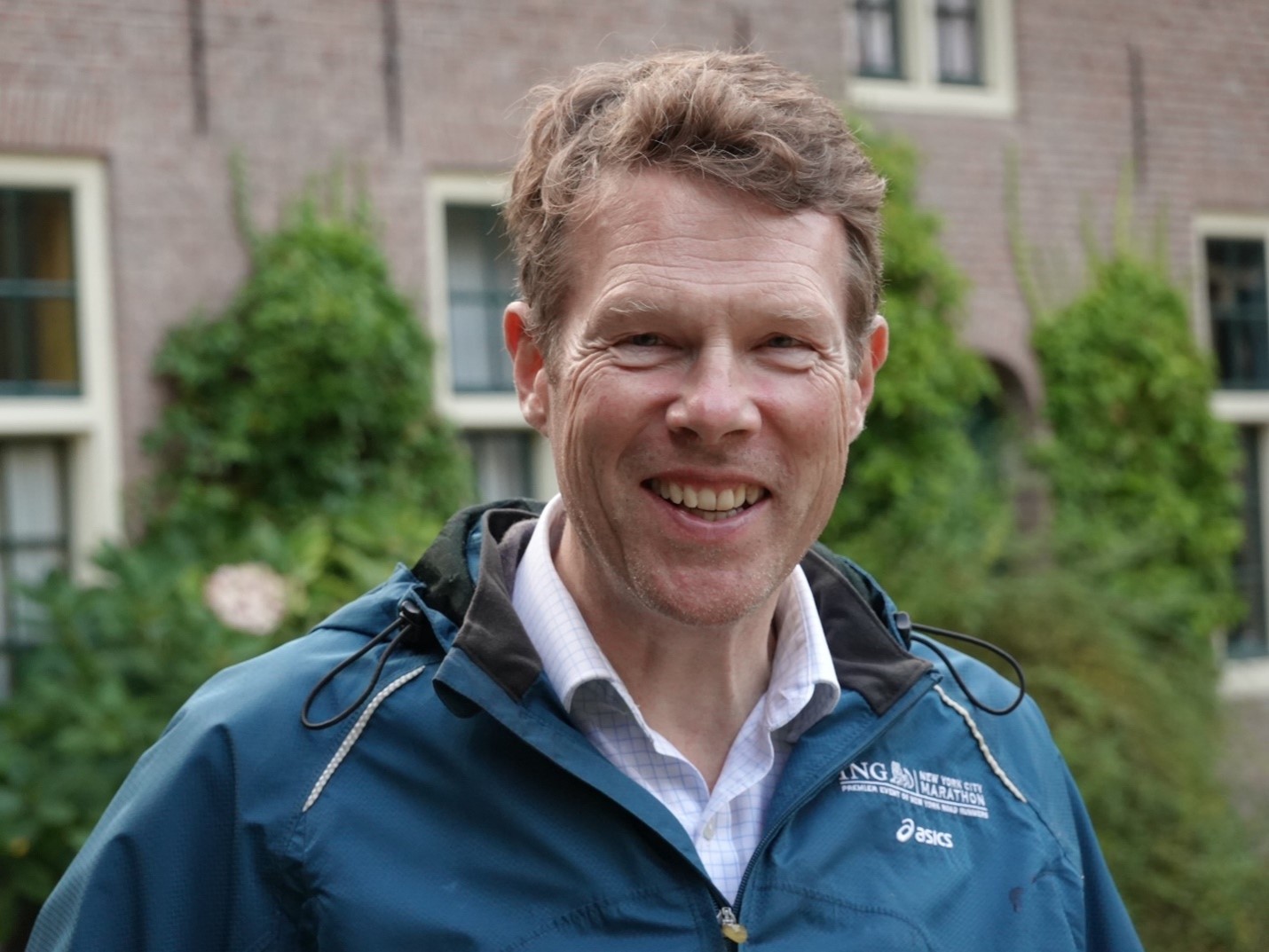
City: Brussels, Belgium
Institution: UZ Brussel
Position: Clinical geneticist and head of the department of Medical Genetics
Could you tell us about your academic and/or professional background? Why did you choose this career?
Starting with my PhD on Von Hippel-Lindau disease, I am now in the field of cancer genetics for more than over a quarter of a century. Somehow, it keeps on fascinating me the way that cancer and genetics are intertwined; no matter if it is in clinical genetics, teaching or research. Chronologically, after my PhD at Utrecht University in 2000, I was an oncogeneticist in Leiden until 2019, when I was appointed as Professor in Medical Genetics and Head of the Department of Medical Genetics in UZ Brussel.
Which of the rare genetic tumour risk syndromes (GENTURIS) area of expertise do you represent?
Currently, I represent hereditary breast and ovarian cancer in GENTURIS, but I have a broad interest in the many forms and characteristics of hereditary cancers.
What does a typical day look like for you? Walk us through your day-to-day work.
I think like for the most of us, a vivid combination of clinics, teaching students, research, and training of young colleagues, administrative work, management and meetings. In the spare time, I like to run, cycle and practice some molecular cooking.
How did you become involved in ERN GENTURIS and what do you believe are the benefits to joining?
For patients, as well as their family members with a tumor predisposition, we are striving for the best possible care, whatever their place or background is. Our main goals are to ensure that expertise is within reach for all patients and that knowledgeable healthcare providers agree upon surveillance & treatment.
What do you think is the main benefit of involving patients/patient representatives in ERN GENTURIS?
It is important to hear their voice on how management for cancer predispositions should be organized in their interest. Within these encounters we have to be sensitive of the individual context of patient representatives.
What is your motto or a quote that you live by as a professional and/or individual?
Depending on the context and the situation, I often live by an old Dutch saying, that could be translated as: "enough is more than plenty", which would be comparable with "less is more".
In the Spotlights: Meet Assoc. Prof. Charlotte Kvist Lautrup
Posted on 11 September 2023
Name: Charlotte Kvist Lautrup 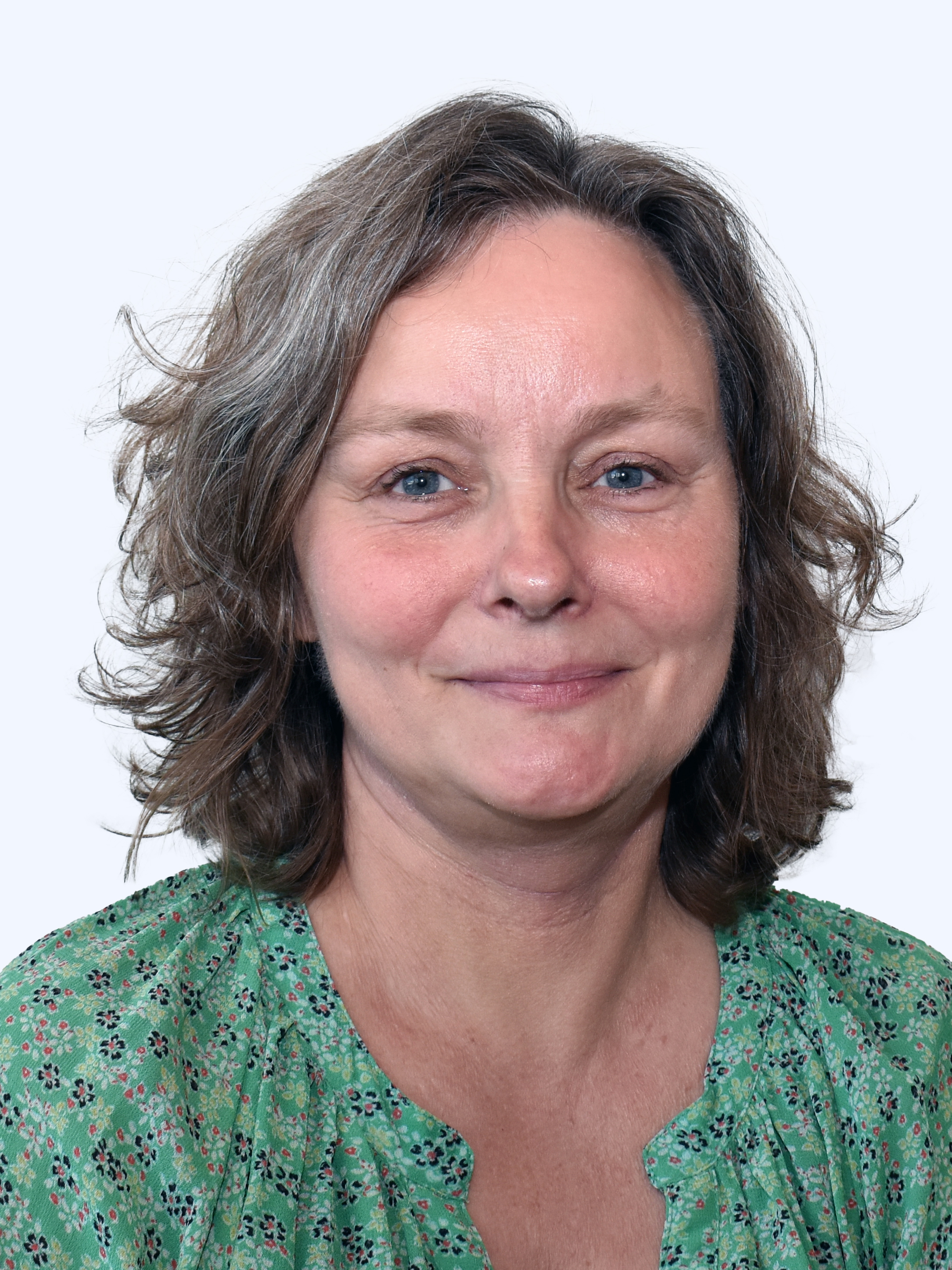
City: Aarhus, Denmark
Institution: Aarhus University Hospital
Position: Consultant, Clinical Geneticist, Associate Professor
Could you tell us about your academic and/or professional background? Why did you choose this career?
I am medical doctor with a lifelong interest in genetics; therefore, clinical genetics was an obvious choice for me. My PhD was on familial colorectal cancer, and since then my work has primarily been in the field of hereditary cancer predisposition.
Which of the rare genetic tumour risk syndromes (GENTURIS) area of expertise do you represent?
Hereditary predisposition to colorectal cancer and polyposis and pediatric oncogenetics. I also have a special interest in Li Fraumeni and PTHS.
How did you become involved in ERN GENTURIS and what do you believe are the benefits to joining?
I joined as part of the hospital’s application for membership. I believe that ERN GENTURIS will raise awareness on hereditary cancer predisposition on hospital, national and international level. The joint collaboration will help us acquire better knowledge on both diagnostics and management for these patients.
What challenges does ERN GENTURIS still face?
I am one of the new members, and I believe we need to focus on how new members can become well integrated in the group. There is also a challenge with making time for this valuable work in a busy daily life with clinical work.
Since joining ERN GENTURIS, what have been your goals?
My goal both now and prior to becoming part of ERN GENTURIS is getting better diagnostics and care for patients and families with hereditary cancer predisposition.
What ERN GENTURIS activities do you participate in and which are your favorite?
I have mostly participated in the CPMS meetings, which have been quite valuable. I look forward to participating in relevant working groups. One of my main interests is to ensure that targeted treatments, such as PARPi in BRCA carriers and immunotherapy for Lynch Syndrome, are considered in early stages when these patients are diagnosed with cancer. This could be an issue for GENTURIS to address.
What do you think is the main benefit of involving patients/patient representatives in ERN GENTURIS?
Whether it is research or creating guidelines, it is important that we take into account what matters to those we are trying to help.
In the Spotlights: Meet Assoc. Prof. Lenka Foretova, MD., PhD.
Posted on 7 September 2023
Name: Lenka Foretova 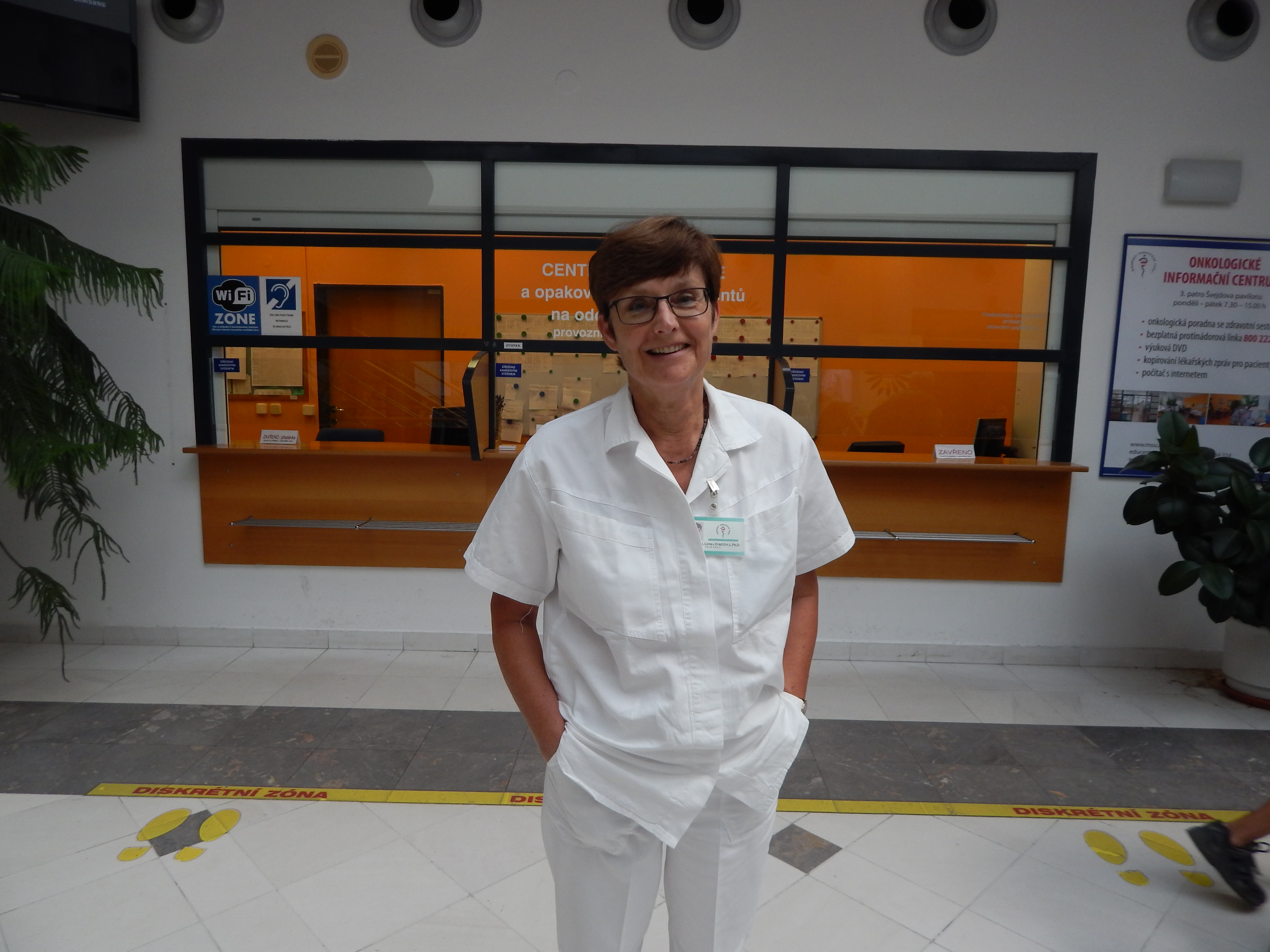
City: Brno, Czech Republic
Institution: Masaryk Memorial Cancer Institute
Position: Head of the Department of Cancer Epidemiology and Genetics
Could you tell us about your academic and/or professional background? Why did you choose this career?
In 1989, while I was working as a pediatrician, my colleague told me about a very interesting specialization, medical genetics. And in 1991, I did a specialization exam. After that, I left with my family and went to Boston, knowing that I would love to learn more about oncogenetics. Through Kathy Schneider, genetic counsellor from Dana Farber Cancer Institute, I met Prof. Frederick Li, Head of the Department of Cancer Epidemiology and Control, and started to work as a volunteer in their molecular genetic lab. Later, I was accepted to work on a project on early detection of breast cancer. I had the opportunity to attend genetic counselling with Kathy Schneider, Prof. Judy Garber and others. In 1997, I returned to Brno and established the genetic department at Masaryk Memorial Cancer Institute.
Which of the rare genetic tumour risk syndromes (GENTURIS) area of expertise do you represent?
We started with genetic testing of BRCA1 and BRCA2 in 1997, and did the analysis for most of the genetic centers in the Czech Republic for some time. So breast and ovarian cancer families are the most frequently seen and cared for, but we also pay very high attention to Lynch syndrome and other even infrequent syndromes. We started to test GAPPS syndrome in 2017 and found that our location, Southern Moravia, is a region of unusually high incidence of GAPPS, and we started to test the promoter region of APC within our pan-cancer panel. We also closely cooperate with specialists for preventive gastrectomy and follow-up care.
What does a typical day look like for you? Walk us through your day-to-day work.
I have genetic counselling sessions every day, laboratory results and final clinical reports controls, seeing patients to discuss results and planning the follow-up. We discuss new patients with other doctors every day. I have collaboration meetings on our research projects within Czech Republic and abroad. For the last two years I have been working, together with my colleagues, on a new book (in Czech) called Hereditary Cancer Diseases in Clinical Practice, which seems to be successful. I attend research boards and regularly teach medical students.
How did you become involved in ERN GENTURIS and what do you believe are the benefits to joining?
I know about ERN GENTURIS from my colleagues in Prague and abroad. I think, through ERN we can learn a lot, but we also can share our long experience in the field of genetics in cancer, and our close cooperation with other specialists within our cancer institute. The cooperation on research projects is important.
What challenges does ERN GENTURIS still face?
I think that there should be more young people involved in the ERN work. There are many tasks, and we need many specialists for this work. We have to work on mechanisms of how to disseminate the results of our work and improve the testing and preventive care elsewhere.
Since joining ERN GENTURIS, what have been your goals?
Our goal is to cooperate with specialists from other countries on the best possible care for patients and their families with cancer predisposition.
What ERN GENTURIS activities do you participate in and which are your favorite?
We were cooperating on the INSPECT study and start to work also on the family registry. We cooperate on the TF2 study on the availability of genetic services within Europe.
What are the key messages you would like to share with others?
With technical advantages and NGS testing, we should be careful how to deal with all the results and implementation in the life of those tested. Not to harm anyone and not to underestimate the adjacent implications.
What do you think is the main benefit of involving patients/patient representatives in ERN GENTURIS?
Having their opinion (from the opposite side) is crucial for us.
What is your motto or a quote you live by as a healthcare professional and/or individual?
Try to move our abilities ahead, get more people involved and make their work pleasant and interesting. In 1997 the movie GATTACA was very futuristic, but now we are almost there technically, and have to be wise and careful. Help people and do not harm.
In the Spotlights: Meet prof. Alessandra Renieri
Posted on 5 July 2023
Name: Alessandra Renieri 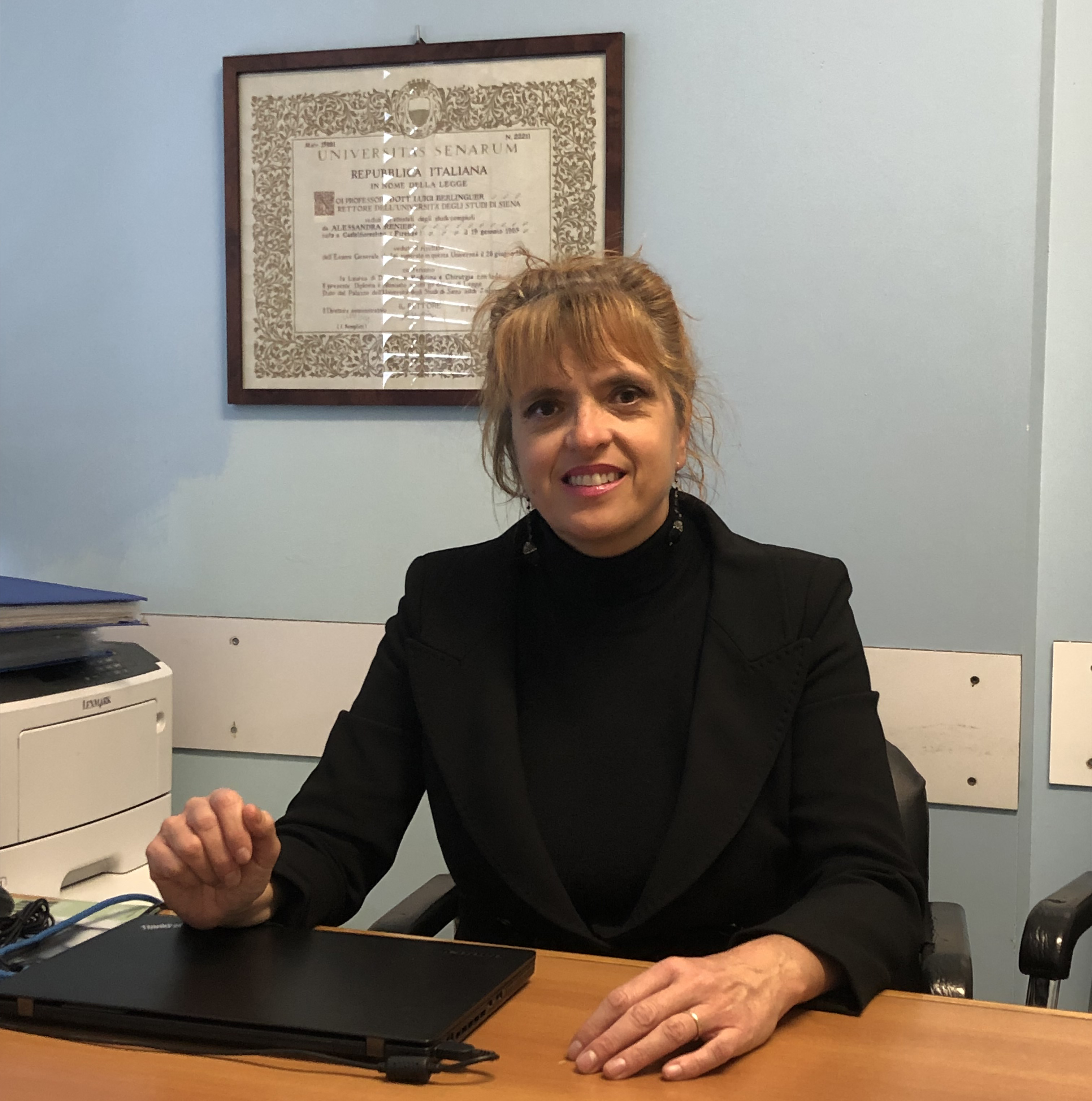
City: Siena, Italy
Institution: Azienda Ospedaliero-Universitaria Senese (AOU Senese)
Position: Full Professor/ Director of the Medical Genetics Unit
Tell us about your academic and/or professional background? Why did you choose this career?
I have a MD degree and a PhD in human genetics, with a specialization in medical genetics. I choose this path because I was fascinated by the power of knowledge of genes, not only in the diagnostic laboratory, but also in the therapeutic field.
What challenges does ERN GENTURIS still face?
I believe the biggest challenge is still finding a way to help people with rare disorders.
What are the key messages you would like to share with the others?
There should be alternative way beside guidelines in order to ensure high quality assistance to the patients.
What do you think is the main benefit of involving patients/patient representatives in ERN GENTURIS?
Have the voice from the other side of the coin.
What is your motto or quote in which you live by as professional or/and individual?
Using guidelines for the clinical assistance is like driving while looking in the mirror.
In the Spotlights: Meet prof. Antonis Kattamis
Posted on 8 May 2023
Name: Antonis Kattamis 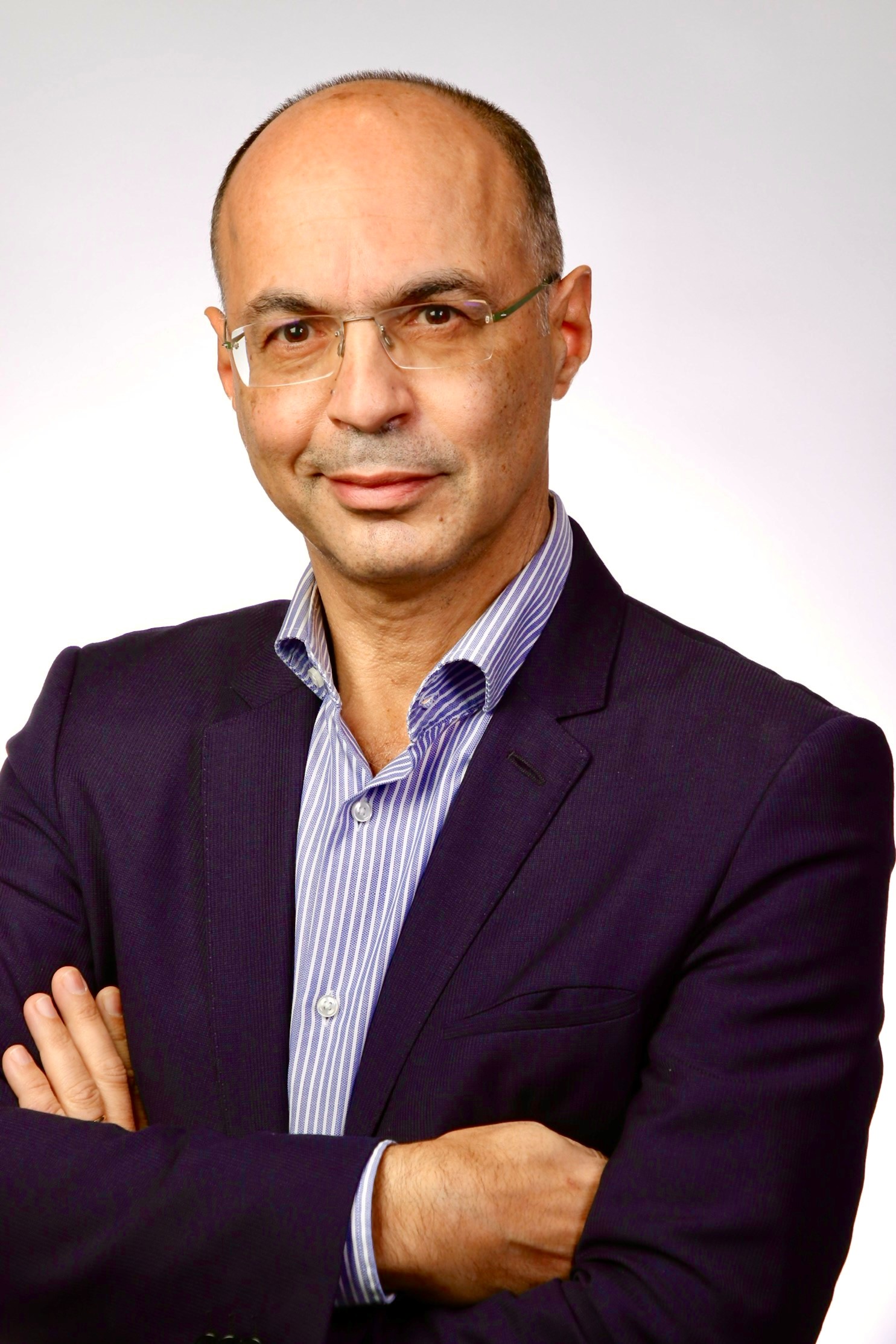
City: Athens, Greece
Institution: Division of Pediatric Hematology-Oncology, First Department of Pediatrics, National and Kapodistrian University of Athens, “Aghia Sophia” Children’s Hospital
Position: Professor of Pediatric Hematology-Oncology, Division Head
Tell us about your academic and/or professional background? Why did you choose this career?
I am a pediatrician, specialized in Pediatric Hematology-Oncology, trained in one of the world’s most prominent programs, at the Children’s Hospital of Philadelphia. I have always loved working with children and adolescents. The field of Pediatric Hematology-Oncology, despite being very challenging, is very fascinating. Trying to do the best and to make a significant impact in the life of these patients and of their families has been the goal of my medical profession.
Which of the rare genetic tumour risk syndromes (GENTURIS) area of expertise do you represent?
The main area of expertise that we represent in GENTURIS is the field of neurocutaneous disorders, especially neurofibromatosis (NF). For the last 10 years, one of our main interests was to organize the Cancer Predisposition Clinic, beginning from the establishment of the multidisciplinary NF Clinic, which was recognized as a Full Member of ERN GENTURIS in 2022.
How did you become involved in ERN GENTURIS and what do you believe are the benefits to joining?
The ERN GENTURIS provides a wide platform to exchange ideas, thoughts, and experiences. Building up collaborative programs aiming at the advancement of science and the well-being of patients are key components of the ERNs. Fostering collaboration is the only means to address rare and complex diseases, such as neurofibromatosis, to improve access to diagnosis and treatment and to ensure the provision of high-quality healthcare for patients all over Europe.
What challenges does ERN GENTURIS still face?
The main challenges derive from the great heterogeneity of the structure and support facilities of the different healthcare providers, which reflect the significant differences between healthcare systems within Europe. This polyphony is one of the greatest advantages, but also weaknesses of this type of collaboration. Another challenge is to communicate the work of ERN GENTURIS at a national level and to better integrate the ERNs to the national healthcare systems.
Since joining ERN GENTURIS, what are your goals in this field?
As one of the few pediatric centers in ERN GENTURIS, we believe we have a lot to offer in attaining the common goals of enhancing scientific knowledge, formulation of guidelines, and of better serving the patients. Pediatric centers can provide substantial information on the clinical course of NF from the early stages of life, which could eventually serve as prognostic markers for long-term clinical course. Finally, organizing educational activities to improve early detection of NF-related manifestations is one of our main goals.
What are the key messages you would like to share with the others?
Working together is the best way to achieve significant tasks. Along with Prof R. Pons, and Drs K. Roka and E. Kokkinou, we established the first multidisciplinary team for NF in Greece, which developed into a center of expertise, and a full member of ERN GENTURIS. We appreciate the Hellenic patients’ organization “Living with NF” support in this joint effort. We feel privileged to participate in this ERN and we encourage other healthcare providers nationally and across Europe to participate.
What is a motto or quote you live by as a professional and individual?
‘No challenge is too big if you have the right team’. It is teamwork that will provide the best care to your patients, the best example to your colleagues, and a balance between professional and private life.
In the Spotlights: Meet Dr. Arvīds Irmejs
Posted on 20 April 2023
Name: Arvīds Irmejs 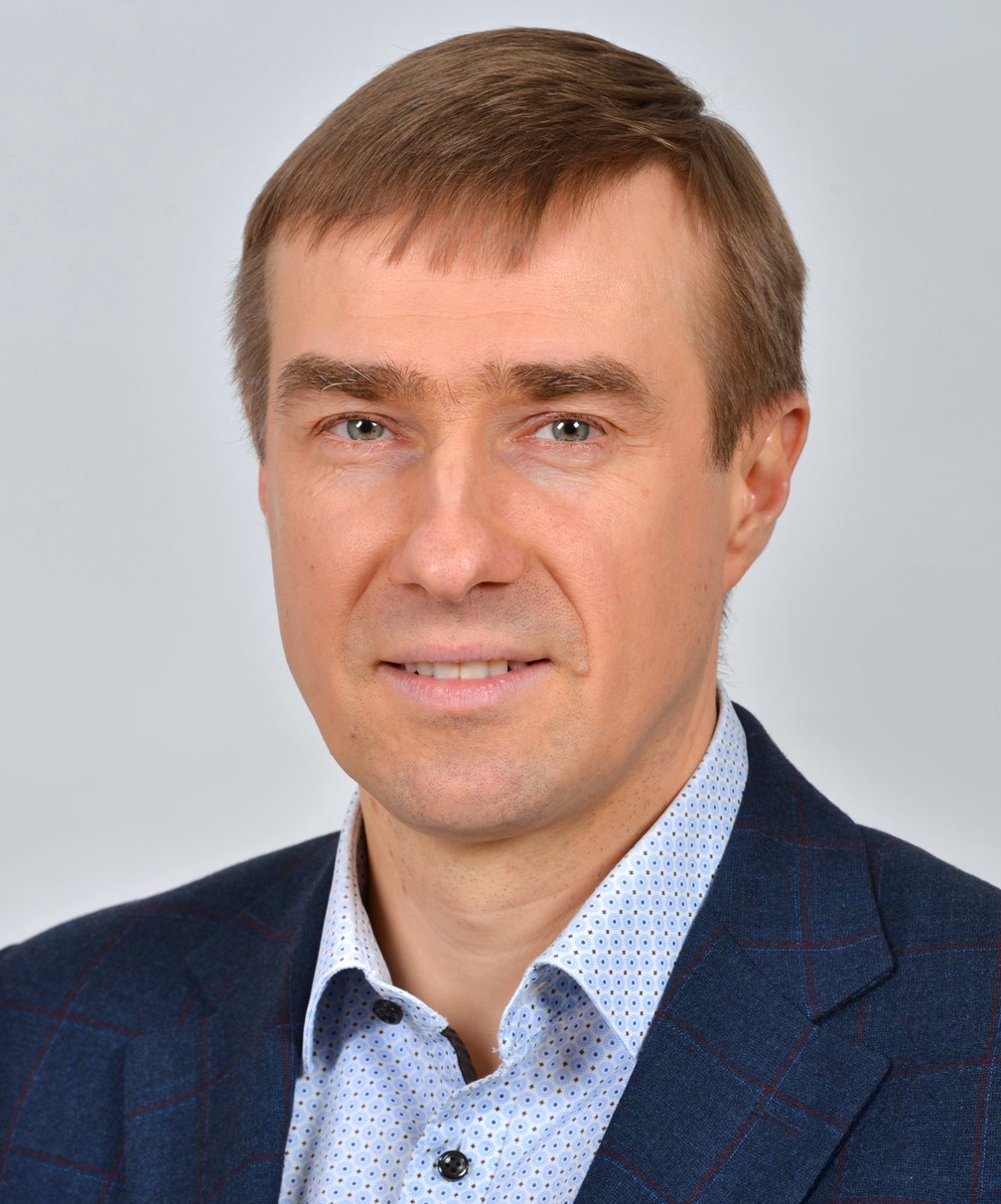
City: Rīga
Institution: Breast Unit, Pauls Stradins Clinical University Hospital/Institute of Oncology, Rīga Stradiņš University
Position: Consultant in breast surgery/associated professor
Tell us about your academic and/or professional background? Why did you choose this career?
My mother was a nurse in hospital and I became closely familiar with medicine quite early in my life. The influence of my parents and strong Christian roots made the decision to study medicine quite straightforward for me.
Which of the rare genetic tumour risk syndromes (GENTURIS) area of expertise do you represent?
Hereditary breast and ovarian cancer.
What does a typical day look like for you? Walk us through your day-to-day work.
Alarm at 5.45 (if early surgery then 5.30)
Arrival at the hospital 7.50 (if early surgery then 7.20)
Morning meeting of Department of Surgery 8.00
Departure from the hospital around 18.00
Monday mornings: Students/office, afternoon clinic/surgery
Tuesday: Surgeries
Wednesday: Clinic/MDT meeting/office
Thursday: Clinic/MDT meeting/weekly surgery planning for breast unit
Friday: Surgeries
Saturday mornings: 8.00-9.30– discharge of patients
Private praxis: Monday and Thursday 18.00-20.00
How did you become involved in ERN GENTURIS and what do you believe are the benefits to joining?
My cancer genetics professor - Prof. Jan Lubinski from Poland invited me to join in 2019. Benefits are huge for both patients and institutions. Public financing for panel testing was obtained. Annual breast MRI screening was introduced. Complicated cases are discussed in CPMS. Participation in research projects (e.g. SolveRD) contributes to finding of molecular background for unsolved cases – e.g. 23-year-old breast cancer patient with TP53 mosaicism. Inter ERN collaboration – e.g. EURACAN.
What challenges does ERN GENTURIS still face?
In our country the administrative staff for ERN GENTURIS activities are covered only 16 hours per month. It is by far not enough, as physicians alone are not able to keep up with all ERN activities in the long run.
Since joining ERN GENTURIS, what have been your goals in this field?
The ultimate goal is to identify all HBOC risk cases in Latvia pre-symptomatic and to secure early diagnosis or risk reduction.
What ERN GENTURIS activities do you participate in and which are your favorite?
Annual meetings, CPMS, National coordinators’ meetings and development of registry – all of which I enjoy.
What are the key messages you would like to share with the others?
It is a great satisfaction (sounds a bit strange) when I receive screening MRI/pathology report on 5mm asymptomatic breast cancer for BRCA1/2 positive case, which otherwise would be diagnosed with symptomatic malignancy. Similarly, more than 100 risk reductive mastectomies performed in our unit during the last decade have prevented dozens of breast cancer cases and related sufferings. It is worth investing in cancer genetics!
What do you think is the main benefit of involving patients/patient representatives in ERN GENTURIS?
Patient reported outcome measurements (PROMs) are very important for improvement of care. Patients’ voice usually has been heard better than physicians by public health care organizers. A recent example in our country is the provision of public funding for post-mastectomy breast reconstruction in asymptomatic BRCA1/2 carriers.
What is a motto or quote you live by as a professional and individual?
Do not be afraid to do too much good.
In the Spotlights: Meet Dr. Remco van Doorn
Posted on 16 March 2023
Name: Remco van Doorn 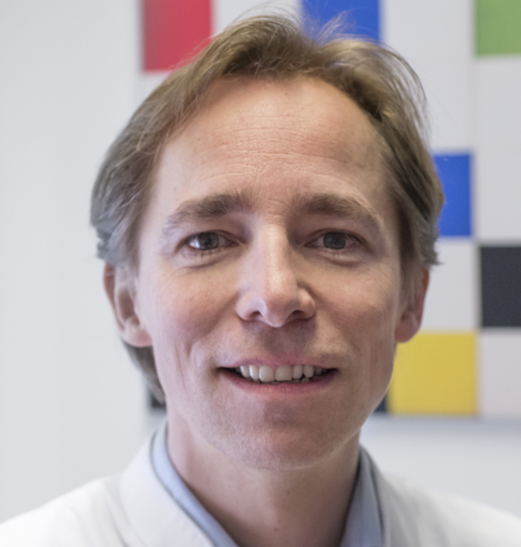
City: Leiden
Institution: Leiden University Medical Center
Position: Dermatologist
We are excited to feature an interview with Dr. Remco van Doorn, a dermatologist from Leiden, the Netherlands.
Tell us about your academic and/or professional background? Why did you choose this career?
During my medical studies I developed an interest in tumour genetics and dermatology. While training as a dermatologist I became involved in cutaneous T-cell lymphoma studies and as a postdoc in melanoma research. At Leiden University Medical Center (LUMC) there is a longstanding interest in hereditary melanoma, which is related to the presence of a large population of carriers of a pathogenic CDKN2A gene variant (p16-Leiden founder mutation) in surrounding towns. Academic dermatology permits me time to spend on translational research.
With clinical geneticists Maartje Nielsen and Christi van Asperen at LUMC, we have a particular expertise in the hereditary melanoma, bowel cancer and breast cancer. My area of interest is mostly limited to familial clustering of melanoma due to CDKN2A and BAP1 gene defects.
What does a typical day look like for you? Walk us through your day-to-day work.
Each day is different. On Monday patients at high risk of melanoma are seen during specific consultation hours and subjected to skin examination, total body photography, dermoscopy, sometimes surgical excision and referred for genetic counseling.
There are many meetings in the week, partly related to research and teaching and too many administrative tasks. We contribute to larger research initiatives on familial melanoma, such as genomics studies and guideline development. In addition, we have initiated studies aimed at understanding the consequences of CDKN2A inactivation and senescence induced by activation of this gene on a cellular level. During the week there are pleasant interactions with dermatology residents, in joint clinical problem solving. Management of familial melanoma is multi-disciplinary, involving clinical geneticists, pathologists, oncologists, surgeons, radiologists, ophthalmologists and gastro-enterologists; the atmosphere at LUMC is very collegiate.
One day of the week I work at Antoni van Leeuwenhoek Hospital (Netherlands Cancer Institute), also to support research collaborations.
How did you become involved in ERN GENTURIS and what do you believe are the benefits to joining?
Maartje Nielsen, Christi van Asperen, clinical geneticists at LUMC, and I thought we might benefit, as national centers of expertise, to join a larger European network partly for the exchange of expertise it would allow. In particular for rare diseases, information to base management decisions on is limited; sharing of expertise, combining datasets and conducting joint studies are necessary to advance our understanding and level of care.
What challenges does ERN GENTURIS still face?
The registration of patient data is a laborious task and the medico-legal aspects may be difficult as well. For small patient groups data registration is feasible, whereas for large patient cohorts this could be challenging for centers where research support is limited.
Since joining ERN GENTURIS, what have been your goals in this field?
Specific goals from the perspective of familial melanoma would be to increase our insight into the substantial proportion of families where no genetic cause for melanoma susceptibility has yet been identified. In addition, the surveillance programs should be based on reliable estimates of risk of different tumour types, which is not available for some of the hereditary tumour syndromes. There might also be cancer treatments specifically tailored to hereditary tumour syndrome patients carrying a certain genetic alteration. The Dutch healthcare system is well-organized, and hereditary cancers are a focus area at LUMC. Expectedly for hereditary melanoma, bowel cancer and breast cancer, our group at LUMC can contribute to the GENTURIS network.
What ERN GENTURIS activities do you participate in and which are your favorite?
Practicing as a dermatologist and not a clinical geneticist, some of the educational activities are of less immediate relevance to me. I particularly enjoyed an online presentation on genetic mosaicism. Several skin diseases present in mosaic form and the visual representation of this genetic phenomenon with patterns, for example demarcated by Blaschko’s lines, can be striking.
What are the key messages you would like to share with the others?
If you would have an ambitious research question, do not hesitate to approach and involve us.
What do you think is the main benefit of involving patients/patient representatives in ERN GENTURIS?
Often the patient is most capable of formulating which medical need is the most pressing. It is important to align our activities as a network to those needs.